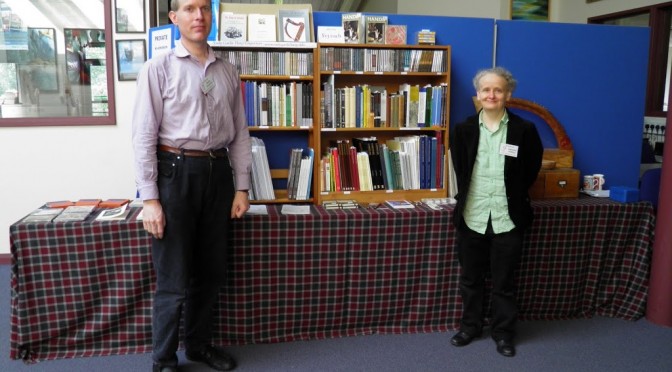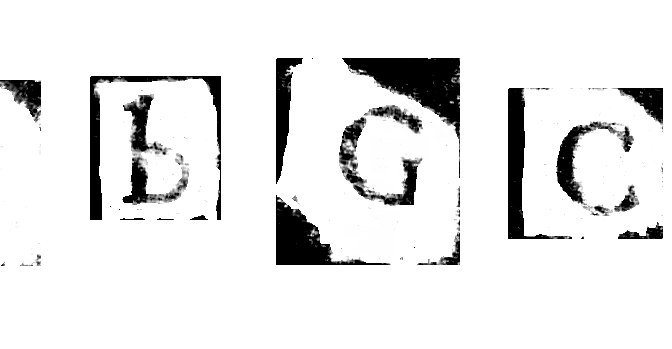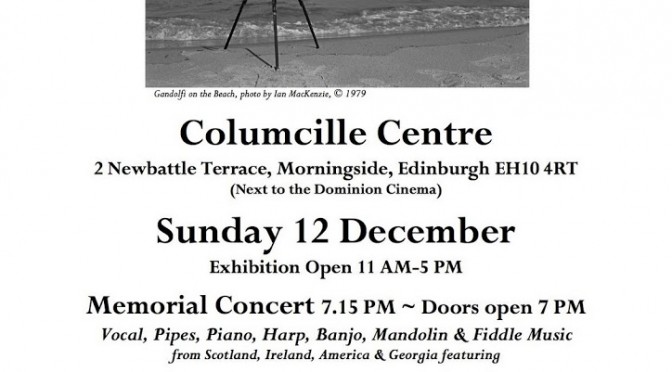We are just back from the Edinburgh Harp Festival. It is hard work, running the Emporium stall all day each day, but we managed to talk to some interesting people.
news
Gestures book
Today I sent out an announcement of the availability of my new book, “Gestures”. You can find out more here: www.earlygaelicharp.info/gestures
I considered many different options for publishing this book, including approaching another publisher, though I prefer to publish in house through earlygaelicharp.info. Normally, one would use a commercial printing company to make and bind the books, but a conventional printers needs a run of 1000 to make economic sense – the setup costs are high in relation to the cost per unit. I was not sure this made sense for such a niche specialist publication.
I also considered using a print-on-demand company. These will print and bind one copy at a time for you – Lulu is perhaps the best known, though there are others who focus more on the needs of small publishers. However a big problem with these is the cost of shipping the printed books from the company; what you gain in flexibility of being able to order small numbers, you lose in the economy of scale for delivery.
In the end I have decided to keep this book entirely in-house, and it is being published as a hand-made book. Below you will see a photo of the first batch being assembled in my workshop. The big advantage of this method is that it gives me complete control over the design of the binding – in this case it is traditionally hand-sewn to make sure that the book will easily open completely flat – an important consideration for a music book, that will be placed on a music stand.
Anyway, I enjoy bookbinding as much as book design and writing!
Patrick Byrne radio interview
Today I did a short radio interview with the Drogheda local radio station LMFM. They are making a programme about Patrick Byrne and were looking for some background information on the early Irish harp tradition. I will let you know when the programme is aired!
Cathedral recitals 2011
Historic Scotland have confirmed the dates for the summer 2011 cathedral recitals, in the ruins of St Andrews Cathedral in Fife, Scotland.
The dates are 7th June, 5th July, 2nd August, 6th September. That’s the first Tuesday of every month, at 12.45pm.
For more details please see http://www.simonchadwick.net/cathedral/
Rory Dall Morison
I have long been interested in the music of Rory Dall O’Kane, the early 17th century harper-composer from Norther Ireland who lived and worked in Scotland, composing tunes for the Perthshire and Central Scottish gentry and nobility in the 1620s and 1630s. I included a number of his tunes on my CD including Port Atholl, Port Gordon, Da Mihi Manum and Lude’s Supper.
However I have long felt that I should also be interested in the music of Rory Dall Morison, the late 17th century harper and poet to Iain Breac MacLeod at Dunvegan Castle on Skye in the 1680s. Unfortunately, the harp tunes often ascribed to him (such as Rory Dall’s Sister’s Lament, or the Fiddler’s Contempt) appear in manuscripts written before his birth (in 1656), and so it seems that the ‘Rory Dall’ tunes all belong to O’Kane.
What Morison did do without a doubt was compose songs, and perform them with harp accompaniment. William Matheson’s book The Blind Harper is a great edition and translation of these songs.
I have just found on Tobar an Dualchais, a lovely field recording from 1953, of Calum Johnston singing Rory Dall Morison’s song to Iain Breac. Rory Dall laments that Iain is away down South, and that he misses him greatly – it has almost romantic overtones, with Rory pining for Iain like a lover. You can listen to this performance here: http://www.tobarandualchais.co.uk/fullrecord/7364/1
I’m hoping to work up a version of this. Maybe down the line I will post a Youtube of it…
Fiddle
Bands, collaborations and sharing platforms
One question I’m often asked is whether I play with an orchestra, or, if the questioner is more aware of music scenes and genres, if I play with a group or band. I find it interesting that there seems a lot of subtle expectation or even social pressure on musicians to join forces, the modern symphony orchestra with choir I suppose being the ultimate manifestation of this. In classical music, performers are rarely truly solo – pianists and organists being the only ones to regularly perform unaccompanied.
In Scottish and Irish music I see it a lot as well, though to a lesser extent – groups are rarely more than 4 or 5 strong, much smaller than a symphony orchestra. But it’s fairly uncommon to find recordings or professional performances of unaccompanied singers or fiddle players. I think the more high profile and professional the gig, the more expectation there is of having other people performing at the same time.
Harp string labels
Recently I wrote a new page on earlygaelicharp.info, about possible inscriptions on the Queen Mary harp. As part of this I reviewed my photographs of the labels glued on the harp labelling some of the strings, and then I had the idea of photoshopping and cleaning up the photos, scaling them, printing them out and glueing them onto my replica in the appropriate positions.
For those of you with a Queen Mary replica who want to join in the fun, here is the image I ended up with. Print it out at 486dpi onto good old fashioned white or off-white laid paper, cut out along the black edges, and stick on using flour and water paste. The numbers go on the right hand side* of the string band (so they are visible for a left orientation player), and they are upside-down when the harp is in playing position, so the player can read the letters. They go in order, counting from the treble: 1 [illegible], 8 [c], 9 [b], 11 [G], 15 [C], 22 [C].
Any problems or questions let me know! If you send in a photo of your harp with the labels stuck on, I will feature it here!
*Right and left hand side of the harp are described as from the viewpoint of the player, not of an onlooker
Ian MacKenzie Memorial Concert

On Saturday 12th December I’ll be in Edinburgh for the first Ian MacKenzie Memorial Concert. I was honoured to be asked to play at Ian’s funeral in Kintail almost a year ago. The concert looks to have a very interesting lineup and should be worth attending, not least for the promised homebaking and the exhibition of Ian’s super photographs.
The concert is at 7.15 pm, at the Columcille Centre, Edinburgh, 2 Newbattle Terrace, Morningside, Edinburgh EH10 4RT
Full details on http://www.zenbends.com/
Unicorns
 Yesterday I was listening to In Our Time and they were discussing unicorns. The discussion of how unicorns were depicted in medieval art was very interesting and made me think of the unicorn on the forepillar of the Queen Mary harp, carved perhaps in South Argyll, Scotland, in the 15th century. That one is slightly unusual in that it has a short, thick, snout-mounted horn rather than the usual long twisted forehead-mounted one, but most strange of all is that it is stuffing a fish into the mouth of a Lindworm (wingless bipedal dragon). It is also not clear what the projection above its eye might be – a forelock or mane, or an eyebrow, or a rudimentary second horn?
Yesterday I was listening to In Our Time and they were discussing unicorns. The discussion of how unicorns were depicted in medieval art was very interesting and made me think of the unicorn on the forepillar of the Queen Mary harp, carved perhaps in South Argyll, Scotland, in the 15th century. That one is slightly unusual in that it has a short, thick, snout-mounted horn rather than the usual long twisted forehead-mounted one, but most strange of all is that it is stuffing a fish into the mouth of a Lindworm (wingless bipedal dragon). It is also not clear what the projection above its eye might be – a forelock or mane, or an eyebrow, or a rudimentary second horn?
The illustration here shows the Queen Mary harp unicorn as copied by David Patton on my replica of the harp.











